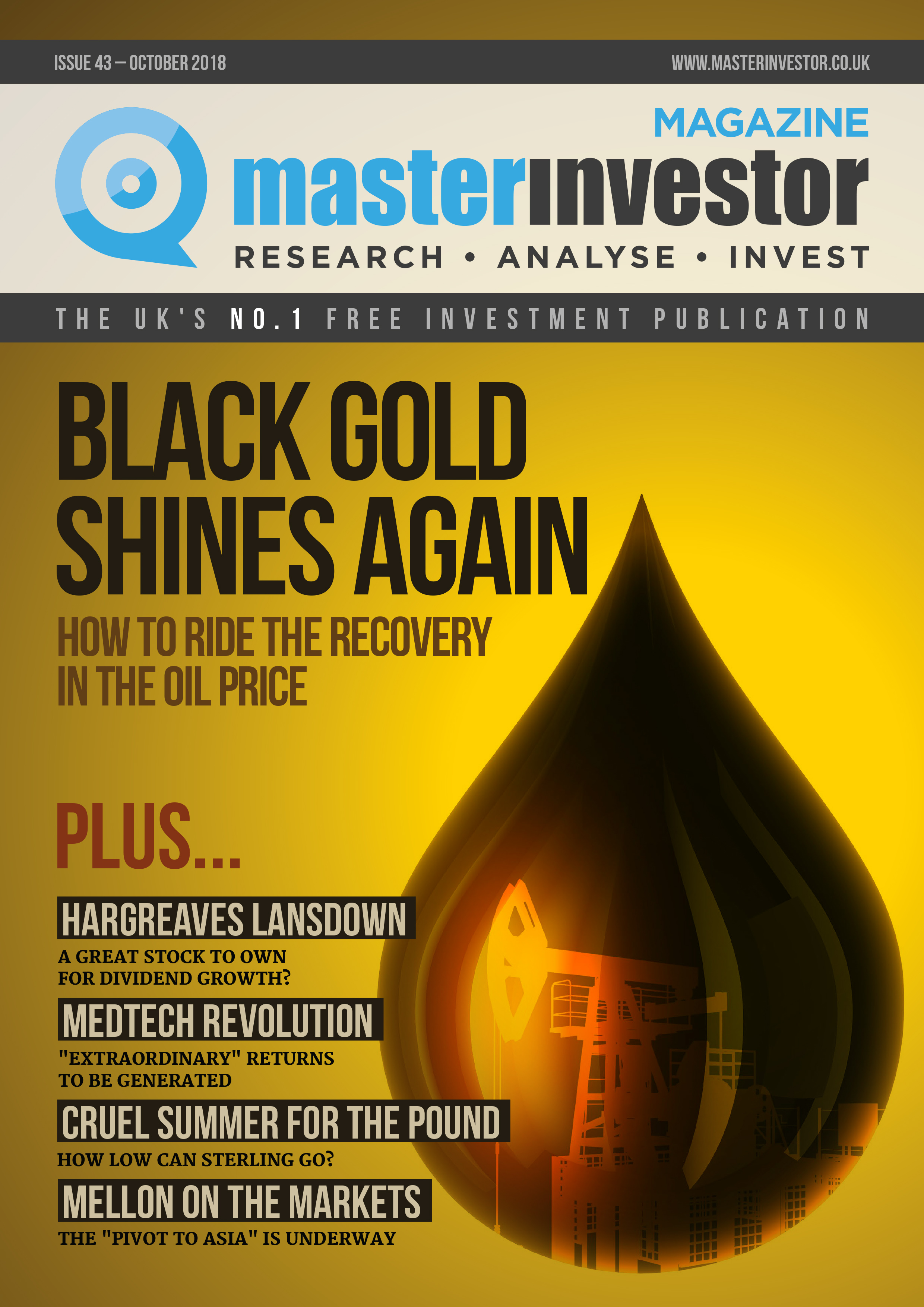Watch out for the dead cat bounce

Although I am definitely a dog lover over a cat lover, I am an animal lover first and foremost. Thankfully therefore I have never seen a dead cat, less still one that bounces. However, I am preparing myself for that unsightly eventuality over the coming weeks.

Never miss an issue of Master Investor Magazine – sign-up now for free! |
Before you ring the RSPCA I should make clear that I am of course talking about the stock market. The infamous ‘dead cat bounce’ refers to the time when a stock market rallies from a low point as investors expect a recovery in prices and it is usually fuelled by the same people who have already lost their shirt in the downward market correction that precedes the bounce. On paper it may even seem like the right thing to do because the market looks cheap and it seems the perfect time to buy, plus of course there is renewed hope as the media is beginning to talk about bargains (what do they know?).
Anyway, somehow large swathes of investors manage to convince themselves that by ‘averaging down’ (i.e. buying more of a company at a lower price which helps to bring their average price down), they are more likely to be successful. This always seemed an alien concept to me. It could be because I am naturally risk averse (yes most professional traders don’t take high risks) or maybe it’s just because I began my foray into the equity world in penny shares and so I have seen my fair share of companies that collapse into oblivion.
Whatever the reason it’s counter intuitive to me as a human being to want to repeat a mistake and buy more of something that has already lost me money. I mean think about it, you buy shares in Company A for £2 and the company subsequently loses 50% and is now trading at £1. I have already lost half of my capital, so do I really want to lose more?
This is not the time to double up
Of course, I understand the logic behind averaging down because if you don’t average down then the only way in which you can expect to get your money back will be if the stock doubles in price. I get that. And at least by the averaging down strategy your breakeven point will now be ‘only’ £1.50. But an investor only has to utilise that type of warped logic because they messed up in the first place and allowed the stock price to get away from them.
That’s why I am always championing the risk element of any portfolio – why let a stock fall by 50% while you sit by and watch idly? Surely a stop loss, or a shorting strategy would have been a sensible option?
And the reason that I share this today is for this reason – because I can see investors are now beginning to make this cardinal mistake – they are doubling up, and in some cases even tripling or quadrupling up! This is a huge mistake because the market is going lower.
In fact, for those of you who follow my articles, you will know that this will be my 3rdsuccessive week talking about the stock market fall. For some of you it may already have become too much to bear in which case please stop reading now and fill yourself with joy by reading uplifting stories about Prince Harry and Meghan’s new arrival. I am sure they will share your pain when you lose half of your retirement fund when the stock market crashes.
For everybody else I really think that it is necessary to have this message replayed over and over again until it sinks in. I’m sorry but the old adage of ‘I’m a buy and hold investor’ just doesn’t make any sense in a falling market. Being a buy and hold investor is in fact the worst thing that you can do when the market is in free fall.
Don’t worry. I won’t be writing articles like this forever.
You see there will be a time – hopefully not too long from now – where I will be talking about the wonders of low risk high dividend plays which could potentially make you lots of money. Or I might write about an amazing strategy (even if I do say so myself) which I created several years ago which helps me to generate almost twice the return that I would normally expect to receive on high dividend FTSE100 companies in a bull market. It’s called The DIP (Dividend Income Plus).

Never miss an issue of Master Investor Magazine – sign-up now for free! |
There will also come a day no doubt where I will talk to you about how you can mitigate your tax burden through sensible mitigation pays (capital gains, income tax and inheritance tax) from all those huge profits you keep making from a rising stock market.
And if I am feeling particularly frisky one morning, I may even share with you my best penny-share tips that are likely to give you explosive growth over the next 12 months, plus my own trading system which enables me to significantly increase the probability of identifying the winners from the losers.
All of this will come in due course but now alas is not the time.
You see I would rather tell the truth and risk being booed off stage than to sing a song and entertain while I see the big green monster come up behind you.
That’s why I will continue to tell you what I think will give you the greatest amount of value.
Saying ‘no’ to IPOs
It’s the same reason that I told my clients not to invest in Aston Martin and Funding Circle. It was not because that either company was a particularly bad proposition but it was everything to do with the fact that it was a bad proposition at the flotation price that was being suggested. I’m always very dubious about IPO prices at the best of times because I see it as an exit strategy for the directors and founders which is made up by a corporate actions team of advisors who are paid to give the highest possible valuation.
What you often end up getting is a mediocre company that has been expertly marketed to the masses to justify the IPO price. I would sooner wait for the market to settle down for a month or so to allow the price to be determined by the marketplace, not a bunch of high-flying corporate financiers who all want a piece of the cake.
Unsurprisingly therefore Aston Martin is down around 12% from its IPO price and Funding Circle is down almost twice that. If you really want to make money on IPOs you will be glad to know that my team did some research and we found that the optimal time to buy is usually 8-10 weeks from the first day of flotation.
That gives the market sufficient time to really evaluate the company and give a better valuation on price. Yes, it means that you will occasionally miss that occasional IPO that goes up 50% on its first day on the market but it also means that you will miss the next five IPOs that all get smashed (a technical term) on their first public outing.
The craziest thing is that investors are now blaming the market for the poor performance of their IPOs and not recognising the simpler fact that they have just been sold a dud. That’s the harsh reality of this. Brokers and advisors will often get paid a little slice to encourage their clients to buy into an IPO and so there is a vested interest for them. It also means greater Assets Under Management (AUM) in many cases so it is the perfect storm and unfortunately the private investor is normally caught right in the middle of it.
And if you think that I only talk about doom and gloom in my articles then you will be glad to know that I also spread my message of darkness on television as well. Just last week I was on CNBC talking about the Italian economy and how it was about to crash.
Just a matter of time
Now that’s a whole new ball game. For those of you who know my position on Europe you will know that this is another prediction that I (unfortunately) got right. The European situation is a disaster and what happened to those poor Greeks a few years ago will happen to the Italians, it’s just a matter of time, mark my words.
The good news is that my consistent message is getting through to some people and action is finally being taken to protect against what I believe to be the impending and inevitable market crash. I know this because we had a large number of emails from investors who are concerned about their portfolios and want to know what they could do about it.

Never miss an issue of Master Investor Magazine – sign-up now for free! |
Some people also wanted to know if it was going to cost them anything! Don’t worry – it’s completely free. Information should always be free in my opinion. Which is why this week I am going a step further and offering investors the chance to watch a one-hour webinar that I specifically recorded for this topic – on how to hedge (insure) your portfolio.
In fact, I explain not one but ten ways in which you can protect your investments from a stock market crash and in one hour you will get a crash course (excuse the pun) of what I have learned in over 20 years.
If you would like a free recording just email my team at info@londonstonesecurities.co.uk.
So, in conclusion I apologise again for those of you who wanted to hear good news about how the worst of the market fall was over and how we were now headed for a protracted period of growth. Trust me when I tell you that there is nobody more than me who would like to share those words of optimism, but like I said, that time is not now.
What isnow is to make sure that you are not one of the many private investors across the UK currently thinking “hmmm…. – Now those shares look cheap…I might just buy a few more”.
Sure, you can make money by doing so and some people I am sure will, but most won’t. That’s because you need to get close to perfect timing which you will be lucky to achieve and just as importantly you will need to get in and out very quickly.
And the reason for getting out quickly is very simple – it’s because if I know anything about animals I know that dead cats only bounce so high.
Ranjeet Singh
CEO of London Stone Securities
Comments (0)